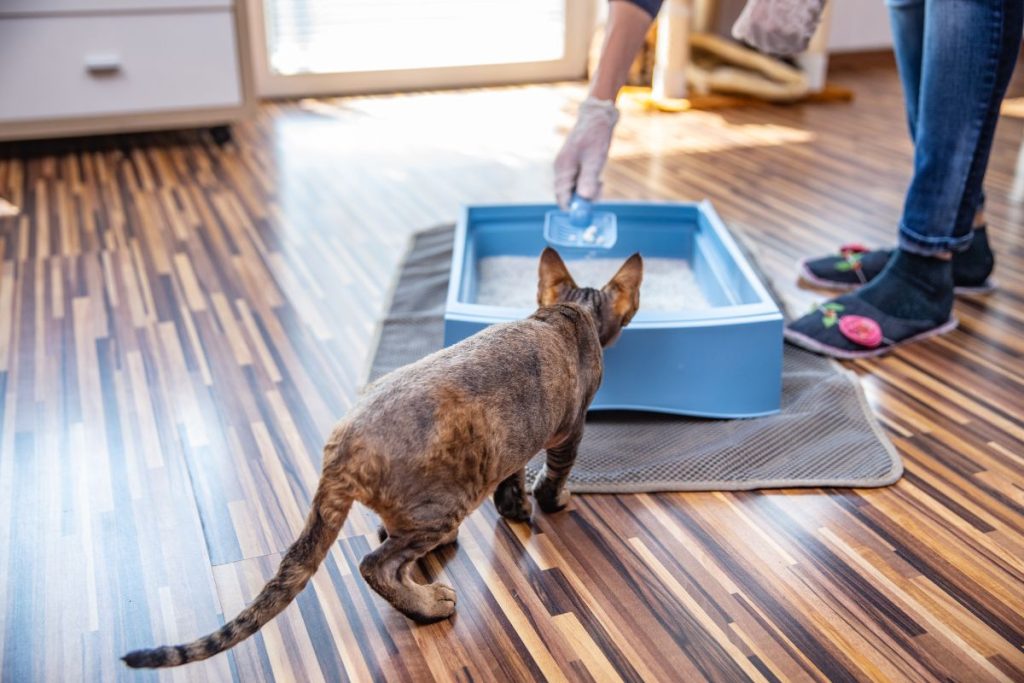Overview
Despite their not-so-affectionate nature; cats continue to be the household pet of millions. These fastidious creatures always tend to do as they please and never listen!
And if the recent quest your cat has been on is house soiling, peeing everywhere, and stinking up the place; we can understand your frustration and cleaning hassle.
But before you lose it over your feline friend you need to find out ‘why’. Read this article to learn why is your cat peeing outside the litter box and what measures you can take to make it stop.
Reasons Your Cat is Peeing Outside the Litter Box
Peeing outside isn’t something cats do out of pleasure to see the annoyance on your face. In fact, it is an indicator of serious underlying medical issues in some cases.
We have listed out possible health problems that might be responsible for your cat’s peeing spree.
Medical IssuesUrinary tract infection
Cats with Urinary tract infections strain to urinate, feel pain and discomfort while urinating, and decrease in urine amount, and a tinge of blood in the urine.
Most cats with UTIs end up associating the pain with the litter box (negative association), so they start peeing outside, everywhere in the house, smelling repugnant. It’s their way of telling you they’re not okay.
Pay close attention to the symptoms and consult a vet right away.Crystalluria
The presence of crystals in urine refers to a condition called crystalluria. The abnormal/ deviant pH of urine cause the formation of crystal upon the cooling of urine’s temperature.
It’s not a major issue mostly. However, in some cases, it can progressively lead to kidney stones in cats. Which in turn affects the urinary tract, and is painful and detrimental.Bladder stones
Rock-like formations in the bladder are formed by the clumping of minerals and other substances together. Bladder stones can cause acute or serious conditions like bladder lining irritation, urethral obstruction, and urinary tract infections.
Changing diet and increasing water intake can help with that.Metabolic disease
Metabolic diseases like hypothyroidism and diabetes affect the normal functioning of the body. Inducing weight loss, weakness, and the need to drink and urinate more frequently than usual.
Hence making it difficult for your feline friend to urinate inside the litter box. Be kind and gentle to the adorable fluff ball in times of difficulty.Degenerative joint disease
Degenerative joint disease, like arthritis, causes severe joint pain in cats, and directly impacts their mobility. Old cats are more likely to suffer from it.
If the litter box requires your cat to jump or climb up. Cats with this condition will dodge going in the box, due to strain on the joints.Feline idiopathic cystitis
Also called FIC, is caused by a change in your cat’s environment followed by a stress response. Cats like routines and are creatures of habit. Handling change is often difficult for them, even if it is as minimal as relocating the litter box, introducing new cat litter, or getting a new type of litter box, etc.
The stress then impacts the cat’s urinary tract, causing them to pee in odd spots (outside the litter boxes). Adding litter boxes and using calming defusers can help in tackling this.Kidney disease
Cats suffering from kidney disease experience a dramatic increase in thirst. Which results in frequent urination. They either fail to reach the litter box for peeing or the litter fills up quickly, not in the state to be used again.An Unclean Litter Box
This shouldn’t come as surprise how clean cats tend to be. Your negligence in not cleaning the litter box won’t be tolerated by your mighty cat, any other ‘clean’ corner in the house will do the job.
Cat prefers a clean, disturbance-free, and comfortable litter box environment. You need to ensure that. The self-cleaning cat litter box can assist you greatly in maintaining cleanliness.A Tough-to-Reach Litter Box
Cats don’t like working hard for anything at all. Therefore, litter box problems like difficulty reaching the litter box can make your cat avoid using it altogether. Choose litter boxes that are easy to use and reach for the cutest feline creatures.Type of Litter
The type of cat litter you use can also cause litter box aversion, hence spoiling around the house. If your cat doesn’t like the color, fragrance, or texture of the litter, it will simply refuse to step a foot inside the litter box. After all, nobody can hold cats accountable for their actions.
The level of litter being too shallow or too high can also contribute to skipping the litter box.Multiple Pets
Sharing might not be the thing cats are good at. What’s theirs is theirs, no question about it! How many litter boxes do you need if you have multiple cats?
Three litter boxes for two cats, and four litter boxes for three cats. Because if your cat finds the other litter boxes busy or dirty, she will refuse to use them. And you’re aware of the aftermath.
So, it’s wise to keep an extra litter box to avoid all the hassle.Behavioral Reasons
One of the reasons cats pee around the house is a change in the cat’s environment or surrounding. It is possible that your cat is disturbed by any recent changes, like new people in the house, or if their routine is disrupted.
Another possibility is that your cat is too stubborn and just doesn’t want to pee in the litter box. But it’s not normal in any way, look for possible reasons.Stress and Anxiety
Stress and anxiety are significant contributors to cats’ inappropriate urination. It may cause your cat to exhibit unwanted behavior like urine marking; making a territorial boundary by leaving their pee. It’s their way of coping with stress/anxiety.Old Urine Smells
Cat owners, you cannot afford to be lazy when it comes to keeping the cat litter box clean. If your cat detects the smell of old urine in the litter box, she will find it gross (as she should).
Scoop the litter box twice, daily, both solid and liquid clumps. If the smell still remains, sprinkle a little baking soda when you’re adding fresh litter.
Signs your cat should see a veterinarian immediately
1- Unusual Litter box behavior like peeing around the house all of a sudden.
2- Vomitting once in a while is normal (greedy fluff balls like to gobble all the food in sight). But if your cat is vomiting frequently, then it’s serious and requires vet attention.
3- Cats love to sleep and dwell in the world of dreams (of fish). However, sluggishness and lack of enthusiasm to get up/play should not be confused with it. It is likely something serious.
4- Loss of appetite or no interest in having anything to do with food in your cat is not normal. Likely to be an undiagnosed health issue.
5- Extreme fatigue, dragging back legs, difficulty moving around; if you notice any of these signs in your cat, seek a vet.
6- Anxiety or restlessness in your cat or any other unusual behavioral pattern also demand attention right away.
Final verdict
Cats usually are stoic creatures, they could care less about things around them (or their owners). Therefore, if you see any sign of distress in your cat, unusual behavioral patterns, house soiling, or anything like that. Your cat is giving you signs that something is wrong with them.
It can be a medical emergency in some cases, while behaviorist fixation in others. Whatever it is, don’t delay!
Overview Despite their not-so-affectionate nature; cats continue to be the household pet of millions. These fastidious creatures always tend to … Read more >

